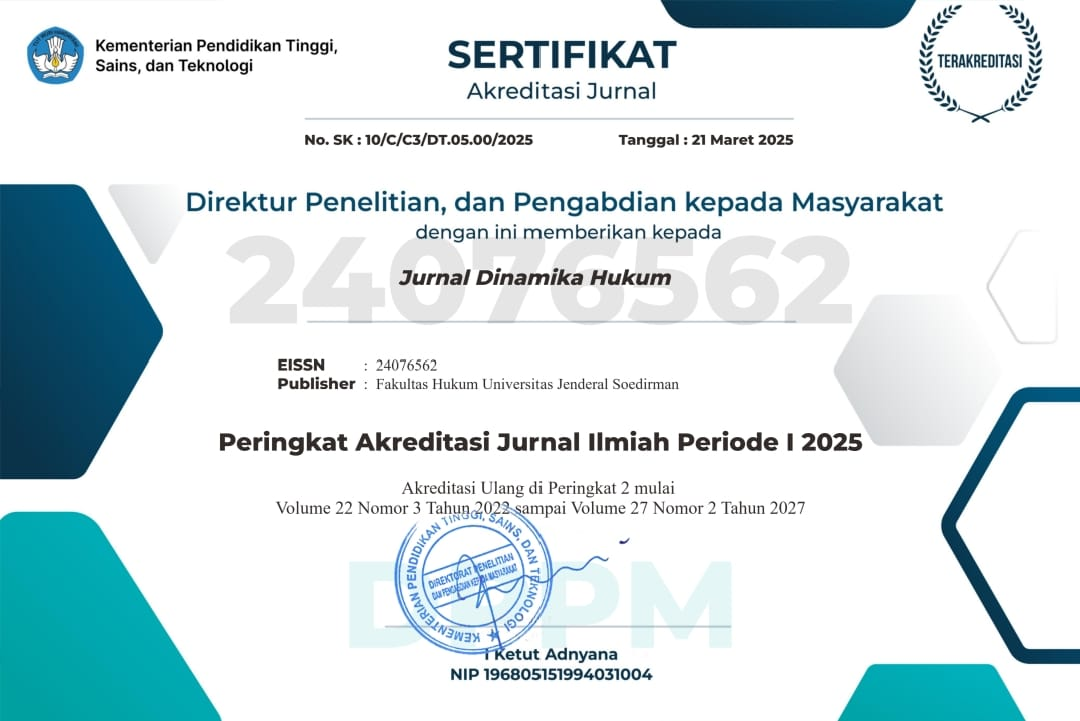|
|
Publication Ethics
Jurnal Dinamika Hukum is committed to upholding the highest standards of publication ethics and takes all necessary measures to prevent any form of malpractice. The Editorial Board holds the responsibility for ensuring the integrity of the publication process, including the prevention of unethical practices. Any form of unethical behavior is strictly unacceptable, and Jurnal Dinamika Hukum maintains a zero-tolerance policy towards plagiarism.
By submitting an manuscript, authors affirm that the manuscript's content is original. Additionally, submission implies that the manuscript has not been previously published in any language, either in whole or in part, and is not under consideration for publication elsewhere. Editors, authors, and reviewers involved in Jurnal Dinamika Hukum are expected to adhere strictly to ethical publication practices and to fulfill their respective responsibilities as outlined in the COPE Code of Conduct for Journal Editors. As part of its Core Practices, COPE has provided guidelines accessible at: http://publicationethics.org/resources/guidelines.
Publication and Authorship
- All submitted manuscripts undergo a rigorous peer-review process conducted by experts in the relevant field;
- The journal employs a double-blind peer-review process;
- Manuscripts are evaluated based on relevance, methodological soundness, significance, originality, clarity, and language quality;
- Possible editorial decisions include acceptance, revision, or rejection;
- If a manuscript requires revisions, resubmission does not guarantee acceptance.
- Rejected manuscripts will not be reconsidered;
- Acceptance of a manuscript is subject to compliance with legal requirements; including those concerning libel, copyright infringement, and plagiarism; and
- Research findings must not be published in more than one journal.
Authors’ Responsibilities
- Authors must ensure that their manuscript is original and their own work;
- Authors must confirm that the manuscript has not been previously published elsewhere;
- Authors must affirm that the manuscript is not under consideration for publication in another journal;
- Authors are required to actively participate in the peer-review process;
- Authors must provide corrections or retractions in cases of significant errors;
- All individuals listed as authors must have substantially contributed to the research;
- Authors must ensure that all data presented are authentic and accurate;
- Authors must disclose any potential conflicts of interest;
- Authors must properly acknowledge all sources used in their research; and
- Authors must promptly report any errors in their published manuscript to the Editors.
Reviewers’ Responsibilities
- Reviewers must maintain confidentiality regarding all submitted manuscripts and treat them as privileged information;
- Reviews should be conducted objectively, with constructive criticism and without personal bias;
- Reviewers must provide clear and well-supported arguments in their evaluations;
- Reviewers should identify relevant published work that has not been cited by the authors;
- Reviewers must notify the Editor-in-Chief if they detect substantial similarity or overlap between the manuscript under review and any other published work; and
- Reviewers must decline to review manuscripts if they have any conflict of interest arising from competitive, collaborative, or personal relationships with any of the authors, institutions, or companies associated with the manuscript.
Editors’ Responsibilities
- Editors have full authority and responsibility to accept or reject a manuscript;
- Editors are responsible for maintaining the content quality and integrity of the journal;
- Editors must consider the needs of both authors and readers in improving the publication;
- Editors must ensure the academic integrity of all published manuscripts;
- Editors must issue corrections or retractions when necessary;
- Editors should be transparent about research funding sources where applicable;
- Editorial decisions must be based solely on the manuscript’s importance, originality, clarity, and relevance to the journal’s scope;
- Editors must not overturn previous editorial decisions without justifiable reasons;
- Editors must preserve the anonymity of reviewers;
- Editors must ensure that all published research complies with internationally recognized ethical guidelines;
- Editors must only accept manuscripts when they are reasonably certain of their quality;
- Editors must take appropriate action in cases of suspected misconduct, whether the manuscript is published or unpublished;
- Editors must not reject manuscripts based on unverified suspicions; any allegations of misconduct must be supported by evidence; and
- Editors must ensure that no conflicts of interest exist between editorial staff, authors, reviewers, and board members.
1.jpg)
1.jpg)


